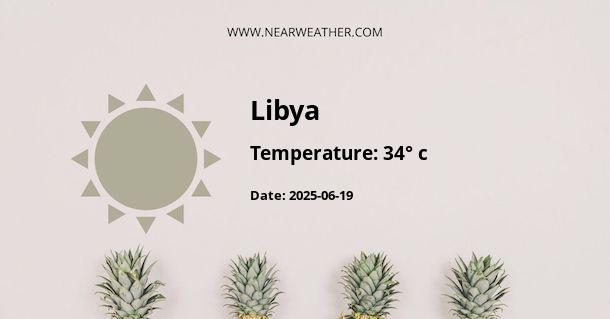Climate and Weather in Libya
Libya is a country located in North Africa, bordered by the Mediterranean Sea to the north. With its vast desert landscapes and coastal areas, Libya experiences a unique climate characterized by hot, arid conditions and a Mediterranean influence along the coast. Understanding the climate and weather patterns in Libya can be essential for travelers and locals alike.
1. Mediterranean Climate along the Coast
The coastal regions of Libya, including cities like Tripoli and Benghazi, enjoy a Mediterranean climate. Summers are generally hot and dry, with average temperatures ranging from 25°C to 32°C (77°F to 90°F) during the day. Winters are mild, with temperatures ranging from 10°C to 18°C (50°F to 64°F). The coastal areas receive most of their rainfall during the winter months, typically between November and March.
The Mediterranean climate brings pleasant sea breezes and relatively cooler temperatures compared to the inland desert regions. The coastal areas are also prone to fog, particularly in the early mornings and evenings, which can reduce visibility.
2. Desert Climate in the Interior
The majority of Libya's territory is covered by the Sahara Desert, resulting in a desert climate in the interior regions. Cities such as Sabha and Murzuq experience extreme weather conditions and are known for their scorching temperatures.
Summers in the desert regions are exceptionally hot, with average temperatures ranging from 35°C to 45°C (95°F to 113°F) during the day. Nighttime temperatures can drop significantly, with averages between 15°C and 25°C (59°F and 77°F). Winters are relatively cooler, with daytime temperatures ranging from 15°C to 25°C (59°F to 77°F) and nighttime temperatures dropping to around 5°C to 15°C (41°F to 59°F).
Rainfall in the desert regions is scarce, with most areas receiving less than 100 mm (4 inches) of rainfall per year. The few rainy months are between November and March, with occasional thunderstorms occurring. Dust storms and sandstorms are also common in the desert regions, particularly during the summer months.
3. Annual Weather Patterns
Libya experiences distinct weather patterns throughout the year due to its geographic location and climate zones. Here is an overview of the annual weather patterns:
| Season | Coastal Areas | Desert Regions |
|---|---|---|
| Spring (March - May) | Mild and pleasant temperatures Increasing rainfall |
Gradual increase in temperatures Occasional rainfall |
| Summer (June - August) | Hot and dry temperatures Occasional heatwaves Foggy conditions in the mornings and evenings |
Extremely hot temperatures Minimal rainfall Dust and sandstorms |
| Autumn (September - November) | Gradual cooling temperatures Decreasing rainfall |
Moderate temperatures Occasional rainfall |
| Winter (December - February) | Mild temperatures Increased rainfall |
Cool temperatures Minimal rainfall |
4. Weather Hazards
While Libya generally experiences a dry climate, there are certain weather hazards to be aware of:
- Sandstorms and Dust Storms: The desert regions are prone to sandstorms and dust storms, which can reduce visibility and create hazardous driving conditions.
- Heatwaves: During the summer months, heatwaves can occur, leading to extremely high temperatures. It is essential to stay hydrated and avoid prolonged exposure to the sun during these periods.
- Flooding: Despite the arid climate, heavy rainfall during the winter months can result in flash floods, particularly in low-lying areas. It is important to be cautious and avoid crossing flooded roads or wadis.
5. Best Time to Visit
The best time to visit Libya largely depends on the specific activities and regions you plan to explore. For coastal areas, the spring and autumn months offer pleasant temperatures and milder weather conditions. However, if you are interested in experiencing the desert regions, it is advisable to visit during the winter months when temperatures are more bearable.
Expert Tip: It is crucial to check the latest travel advisories and consult local weather forecasts before planning your trip to Libya, as conditions can vary.
In conclusion, Libya experiences a Mediterranean climate along the coast with hot, dry summers and mild winters. The interior regions have a desert climate characterized by scorching summers, mild winters, and minimal rainfall. Understanding the climate and weather patterns in Libya can help travelers make informed decisions and prepare for any potential hazards.
A - Libya's Latitude is 25.000000 & Longitude is 17.000000.
A - Weather in Libya is 15° today.
A - Climate Conditions in Libya shows overcast clouds today.
A - Humidity in Libya is 39% today.
A - Wind speed in Libya is 13.86 km/h, flowing at 53° wind direction. today.
